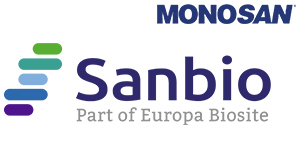Mouse anti-Calcitonin, Clone CL1948 (monoclonal)
Mouse anti-Calcitonin, Clone CL1948 (monoclonal)
SKU
SANMONX11128
Packaging Unit
1 ml
Manufacturer
Sanbio / Monosan
Availability:
loading...
Price is loading...
Clone Number: CL1948
Immunogen: Prokaryotic recombinant fusion protein containing 32 amino acids corresponding to the mature human calcitonin molecule.
Concentration: Greater than or equal to 29 mg/L
Storage buffer: Tissue culture supernatant with 15mM sodium azide
Additional info: Calcitonin (CT) is a 32 amino acid peptide synthesized by the parafollicular C cells of the thyroid. It acts through its receptors to inhibit osteoclast mediated bone resorption, decrease calcium resorption by the kidney and decrease calcium absorption by the intestines. The action of calcitonin is therefore to cause a reduction in serum calcium, an effect opposite to that of parathyroid hormone. The calcitonin gene transcript also encodes the calcitonin gene-related peptide (CGRP), which is thought to be a potent vasodilator. The tissue specificity of the transcript produced depends on alternative splicing of the CT/CGRP gene transcript. In the parafollicular cells of the thyroid 95% of the CT/CGRP is processed and translated to produce CT, however, in neuronal cells 99% of the CT/CGRP RNA is translated into CGRP. The C cells of the thyroid give rise to an endocrine tumor, medullary thyroid carcinoma (MTC), which occurs in a sporadic (75% of cases) and hereditary form (25% of cases). Familial MTC is associated with C cell hyperplasia (CCH), whereas sporadic MTC is thought not to be. However, in the general population CCH is present in 20-30% of thyroid glands, either with normal histology, thyroiditis or follicular tumors.
References: Leboulleux S et al.Clinical Endocrinology. 2004; 61:299–310/Hirsch P et al. Journal of Musculoskeletal & Neuronal Interactions. 2001; 1(4):299–305/Pondel M. International Journal of Experimental Pathology. 2000; 81:405–422
Immunogen: Prokaryotic recombinant fusion protein containing 32 amino acids corresponding to the mature human calcitonin molecule.
Concentration: Greater than or equal to 29 mg/L
Storage buffer: Tissue culture supernatant with 15mM sodium azide
Additional info: Calcitonin (CT) is a 32 amino acid peptide synthesized by the parafollicular C cells of the thyroid. It acts through its receptors to inhibit osteoclast mediated bone resorption, decrease calcium resorption by the kidney and decrease calcium absorption by the intestines. The action of calcitonin is therefore to cause a reduction in serum calcium, an effect opposite to that of parathyroid hormone. The calcitonin gene transcript also encodes the calcitonin gene-related peptide (CGRP), which is thought to be a potent vasodilator. The tissue specificity of the transcript produced depends on alternative splicing of the CT/CGRP gene transcript. In the parafollicular cells of the thyroid 95% of the CT/CGRP is processed and translated to produce CT, however, in neuronal cells 99% of the CT/CGRP RNA is translated into CGRP. The C cells of the thyroid give rise to an endocrine tumor, medullary thyroid carcinoma (MTC), which occurs in a sporadic (75% of cases) and hereditary form (25% of cases). Familial MTC is associated with C cell hyperplasia (CCH), whereas sporadic MTC is thought not to be. However, in the general population CCH is present in 20-30% of thyroid glands, either with normal histology, thyroiditis or follicular tumors.
References: Leboulleux S et al.Clinical Endocrinology. 2004; 61:299–310/Hirsch P et al. Journal of Musculoskeletal & Neuronal Interactions. 2001; 1(4):299–305/Pondel M. International Journal of Experimental Pathology. 2000; 81:405–422
| SKU | SANMONX11128 |
|---|---|
| Manufacturer | Sanbio / Monosan |
| Manufacturer SKU | MONX11128 |
| Package Unit | 1 ml |
| Quantity Unit | STK |
| Reactivity | Human |
| Clonality | Monoclonal |
| Application | Immunohistochemistry (paraffin) |
| Isotype | IgG2b |
| Host | Mouse |
| Conjugate | Unconjugated |
| Product information (PDF) | Download |
| MSDS (PDF) |
|

 Deutsch
Deutsch







